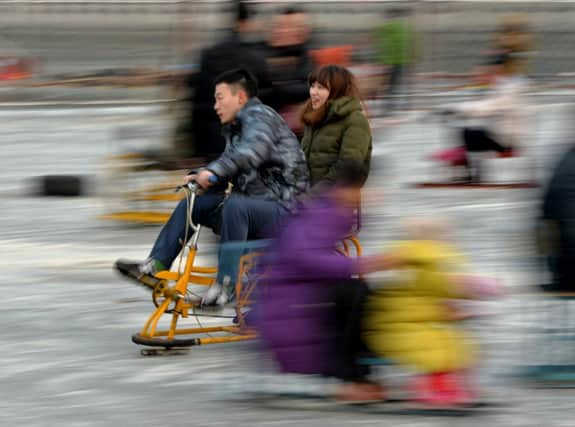Increasing wealth ‘making Asian nations happier’


Levels of happiness in fast-growing nations such as Indonesia, China and Malaysia are said to rival those in Britain, the United States and Germany – wealthy nations that have long topped the happiness charts, according to a global survey by the Pew Research Centre.
The study aims to show rises in national income are closely linked to personal satisfaction and to provide a comparison between nations.
Advertisement
Hide AdAdvertisement
Hide AdThe pollsters asked people in 43 countries to place themselves on a “ladder of life”, with the top rung representing the best possible life and the bottom the worst.
The US-based research body carried out the same survey in 2002 and 2005 in most of those 43 countries, enabling researchers to look at trends over time.
The data also suggested there was a limit to how much happiness money can buy.
About 56 per cent of Malaysians rated their life a “seven” or higher on the ladder, significantly more than the 36 per cent in the poorer nation of Bangladesh.
Yet the public in Germany, which has a far higher gross domestic product per capita than Malaysia, expressed a life satisfaction level of 60 per cent, just four percentage points more than Malaysia.
While wealth is clearly important to happiness, other research has indicated it is far from the only factor.
Women tended to be happier than men, for example, and unmarried and middle-aged people were likely to report lower levels of wellbeing than married and younger people, respectively.
Just as Asians were likely to have reported rises in personal satisfaction over the past five years, they were also especially confident about the future.
Advertisement
Hide AdAdvertisement
Hide AdBroad majorities of Bangladeshis, Thais, Indonesians, Chinese, Filipinos and Indians were expecting their quality of life in five years to be higher on the ladder than it is at present.
The survey showed that people in Jordan, Egypt and Tunisia were among the least satisfied among emerging nations, and also the least optimistic about the future.
The researchers suggested political and social turmoil in the region might be a factor.
Spain, which has seen its economy contract, showed a decrease in reported levels of wellbeing since 2007.
On the key findings, in eight of the 14 emerging countries surveyed in both 2007 and 2014, the percentage who said they stood at seven or higher on the “ladder of life” increased by double-digits.
Some of the biggest gains occurred in Indonesia, China, Pakistan, Malaysia and Russia.
The survey also asked respondents whether their household had each of the following nine items: a television, fridge, washing machine, microwave oven, computer, car, bicycle, motorcycle and radio. In findings replicated across 37 of the countries, the more items a person had on the list, the happier they tended to be.
The research was based on 47,643 interviews in 43 countries with over-18s. It was conducted between March and June.
Advertisement
Hide AdAdvertisement
Hide AdThe Washington-based Pew Research Centre is an independent institution that informs the public about the issues, attitudes and trends shaping the US and the world. It is funded by a charitable trust.